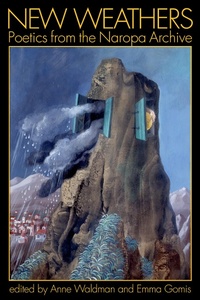
New Weathers: Poetics from the Naropa Archive
Beschreibung
Weitere Details
Weitere Ausgaben
Personen
Emma Gomis is a Catalan American poet, essayist, editor and researcher. She is the cofounder of Manifold Press. Her texts have been published in Denver Quarterly, The Brooklyn Rail, Entropy, and Asymptote among others and her chapbook Canxona is forthcoming from b l u s h lit. She was selected by Patricia Spears Jones as The Poetry Project's 2020 Brannan Poetry Prize winner. She holds an M.F.A. in Creative Writing & Poetics from Naropa's Jack Kerouac School of Disembodied Poetics, where she was also the Anne Waldman fellowship recipient, and is currently pursuing a Ph.D. in criticism and culture at the University of Cambridge.
Inhalt
SANCTUARY & APOCALYPSE
I Tried to Honor the Ancestors, Lisa Jarnot (2017)
Pepper and Salt, Kevin Killian (2014)
Loss and Language, M. NourbeSe Philip (2014)
(tentative title, transcription needs editing)
Dreams, Again, Alice Notley (2008, 2013)
Cultural and Political Rhizomes, Sherwin Bitsui (2012)
The Poetics of Field Experiments in the Evershift, Edwin Torres (2019)
The Wind at Night, Cedar Sigo (2019)
The Coming Mental Range, Will Alexander (2019)
On Contemplative Poetics: A Practice for Saving the World, Allen Ginsberg (1989)
ECOPOETIC ATTENTIONS
The Future of the Past: Eco-poetry and the Carboniferous, Forrest Gander (2008)
How to Get Lost in the Living Room: Brief Thoughts on Bewilderment, Dan Beachy Quick (2018)
Eco-Etho Poetics, Jack Collom (2015)
Danzeling on the Age of the Volcano: Environmental Awareness as the 21st Century Approaches (1992)
Paula Gunn AllenEd SandersLetter from Peter Warshall (Solstice, 2011)
COMMUNAL ACTION
Let's Start Stopping. A Commencement Address, Eileen Myles (2013)
The Collective, Lisa Robertson (2020)
Eros and Ethos, Akilah Oliver (2010)
The Woman in the Wilderness, Peter Lamborn Wilson (1993)
On Property and Monstrosity, Julie Carr (2018)
The Lockout, Lewis Warsh (2018)
Collective Action, Jos Charles (2019)
IDENTITY IN THE CAPITALOCENE
What's the Frequency?: Trends in Contemporary Poetry, Alan Gilbert (2017)Investigative Poetics: Imagination and Documentation, Ronaldo Wilson (2011)
Lyric Embodiment, Hoa Nguyen (2018)
Beyond Sovereignty: Aimé Césaire, Opacity, and a Poetics of Invagination Roger Reeves (2019)
Identity, Narrative, Anti-Narrative, Alexs Pate, kari edwards, Thalia Field, Robert Glück, Thomas Glave (2001)
kari edwardsRobert GlückOn Mistranslation, Layli Longsoldier (2014)
(tentative title, place-holder notes, waiting for Layli's essay version)
Notes of a Dirty Old Man (who masturbates in public), Samuel Delany (2015)
AGAINST ATROCITY
Black Freighter, Tongo Eisen-Martin (2020)
Racoon Magic, Ariana Reines (2014)Ancestors, Eliot Weinberger (2015)
Writer's Block and Noeteny, William S. Burroughs (1981)
On the Edge of Forgetfulness, Eleni Sikelianos (2012)
Panel: Radical Instances: How to Work with Difficult ?Material?What is the Work Now, Rodrigo Toscano (2019)
Late Hominid Poetics, Lisa Jarnot (2017)
Transmission Fluid, Thurston Moore (2018)
A Condition of Impossibility, Lyn Hejinian (1995)
Poetry, Politics and the Real World, Amiri Baraka (2012)
The Question is the Beginning of the Healing: Cecilia Vicuña and Anne Waldman on Ritual and Performance (2021)
BIOGRAPHIES
Systemvoraussetzungen
Dateiformat: ePUB
Kopierschutz: Adobe-DRM (Digital Rights Management)
Systemvoraussetzungen:
- Computer (Windows; MacOS X; Linux): Installieren Sie bereits vor dem Download die kostenlose Software Adobe Digital Editions (siehe E-Book Hilfe).
- Tablet/Smartphone (Android; iOS): Installieren Sie bereits vor dem Download die kostenlose App Adobe Digital Editions oder die App PocketBook (siehe E-Book Hilfe).
- E-Book-Reader: Bookeen, Kobo, Pocketbook, Sony, Tolino u.v.a.m. (nicht Kindle)
Das Dateiformat ePUB ist sehr gut für Romane und Sachbücher geeignet – also für „fließenden” Text ohne komplexes Layout. Bei E-Readern oder Smartphones passt sich der Zeilen- und Seitenumbruch automatisch den kleinen Displays an.
Mit Adobe-DRM wird hier ein „harter” Kopierschutz verwendet. Wenn die notwendigen Voraussetzungen nicht vorliegen, können Sie das E-Book leider nicht öffnen. Daher müssen Sie bereits vor dem Download Ihre Lese-Hardware vorbereiten.
Bitte beachten Sie: Wir empfehlen Ihnen unbedingt nach Installation der Lese-Software diese mit Ihrer persönlichen Adobe-ID zu autorisieren!
Weitere Informationen finden Sie in unserer E-Book Hilfe.